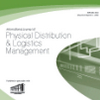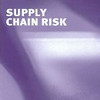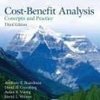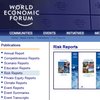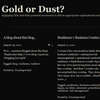 Striking gold in the blogosphere. Or was is just dust? This month’s blog is aptly titled “Gold or Dust” and is based on a true story, namely the academic journey of Charlie Newnham, who is studying for her MSc in Resilience at the University of Cranfield, UK. I wasn’t even aware that such a program existed and the blog chronicles her (almost daily) thoughts, her ideas and struggles as she comes to grip with what to write in her thesis topic, starting in December 2010, and now nearing completion. Is it dust? No, it’s pure gold. At least by my standards.
Striking gold in the blogosphere. Or was is just dust? This month’s blog is aptly titled “Gold or Dust” and is based on a true story, namely the academic journey of Charlie Newnham, who is studying for her MSc in Resilience at the University of Cranfield, UK. I wasn’t even aware that such a program existed and the blog chronicles her (almost daily) thoughts, her ideas and struggles as she comes to grip with what to write in her thesis topic, starting in December 2010, and now nearing completion. Is it dust? No, it’s pure gold. At least by my standards.
Serendipity
I have to admit that I didn’t find this blog all by myself. It was a recent tweet by Ken Simpson that alerted me to this blog, which I instantly put on my “to be reviewed”-list. To no avail, I am tempted to say, since Ken actually beat me to the finish line by posting his review of “Gold or Dust?” before I had the chance to do so. Anyway, a big Thank You to Ken for providing me with blog fodder.
Well, as we say in Norway, “a good thing cannot be mentioned too often”, so here it is, my own review of “Gold or Dust?”. Besides, I guess Charley doesn’t mind the publicity, or do you, Charley?
The purpose of Gold or Dust?
Charley started her blog at the very beginning of her journey towards her degree and in her first post in December 2010, explaining “Why Gold or Dust?”, she writes
I’d like to identify the characteristics of people who make great strategic leaders for resilience – both in ‘peace times’ and during a crisis and see if there are methodologies to indicate them during recruitment phases and/or train them in post-recruitment.
I think that is a very bold ambition, and it would be nice if you could pick who’s resilient and who’s not beforehand, but I’m not so sure it really is possible. I guess I will have to read the thesis to find out.
Oh, and on a side note, and for WordPress nerds only, this really is her first post, since it still bears the “hello-world”-title in the URL a trademark of wordpress.com blogs, which by default are populated with an example post with that URL. Although Charley has changed the post title, which obviously was “Hello World” , she didn’t change the post URL (which she could have done), so in fact, this is the beginning of her blog.
Blog Highlights
Moving on, there is almost too much to pick from, but I have chosen a couple of posts that struck a chord with me. First off is a January 2011 post on Personal Resilience for Organisational Resilience, a post where she explains how personal resilience is a prerequisite for organizational resilience, with hope and optimism as important ingredients:
In a work context, particularly working in crisis operations rooms, it appears that those who deal best with the pressure are those who are confident, optimistic, and intelligent.
I thinks she has a point. Over-optimism and over-confidence is perhaps what leads to the escalation of crises, as Christophe Roux-Dufort writes in his The Devil is in the Details.
The February 2011 posts, for the most, are based on (or just referring to) articles, papers or books that she has read and that made an impact, showing a broad spectrum of resilience-related literature, among others Positive Scholarship, a book that also made an impact with me, in particular the chapter on how organizational resilience is a result of organizational learning.
While the March 2011 posts are mainly tidbits from her academic life, in Crisis management puts huge strain on CEOs she refers to a Reuters article that laments how CEOs are not trained for the many crises they may encounter.
April 2011 only saw two posts (must have been a busy or lazy month), where in Learning from Failure she featured the Harvard Business Review issue on failure and one article on how companies can fail because they don’t analyse the data from their successes. That’s an interesting view.
Her writing has picked up considerably in May 2011, and The Definition of Resilience features no less than fifteen definitions of resilience that she has found in the literature.
June 2011, like April, is a month of few posts, but I had to laugh a bit at The (Resilience) Elephant in the Room, where she ponders how organizations can build resilience if, say, their CEO (or an aspiring one, or any senior manager, to be honest) has no solid record of dealing with crisis, disaster and a great deal of general awfulness? Good question, indeed.
July 2011, busy writing and no time for blogging, but there is some gold here, namely MY definition of resilience, where she defines how she understands resilience.
More gold is found in August 2011, when she in Organisational Resilience – by the Romans writes how Rome could endure for centuries because of capture and governance strategies. I never thought of that, but it makes sense.
Books and Papers
“Gold or Dust?” also features a small section containing a list of selected academic papers on resilience and a section of selected books on resilience, many of which (both papers and books) I hadn’t heard of before, adding more burden to my already overloaded “to be read/to be reviewed”-list. Anyway, thanks, Charley.
Conclusion
I think I will simply side with Ken here, who in his review said that “This is a blog to read and enjoy as ideas are explored developed and refined. It was interesting to read it from the beginning, to see some of the evolution.“
As far as academic blogging is concerned, i.e. truly utilizing blogging for academic development, this is certainly one of the best examples I have seen. Kudos to Charley for a job well done, and I do hope that she will continue to blog even after her MSc, because it would be sad to see this blog end.
Links
- goldordust.wordpress.com: Gold or Dust?
- linkedin.com: Charley Newnham
Related post
- husdal.com: What goes into resilience?


